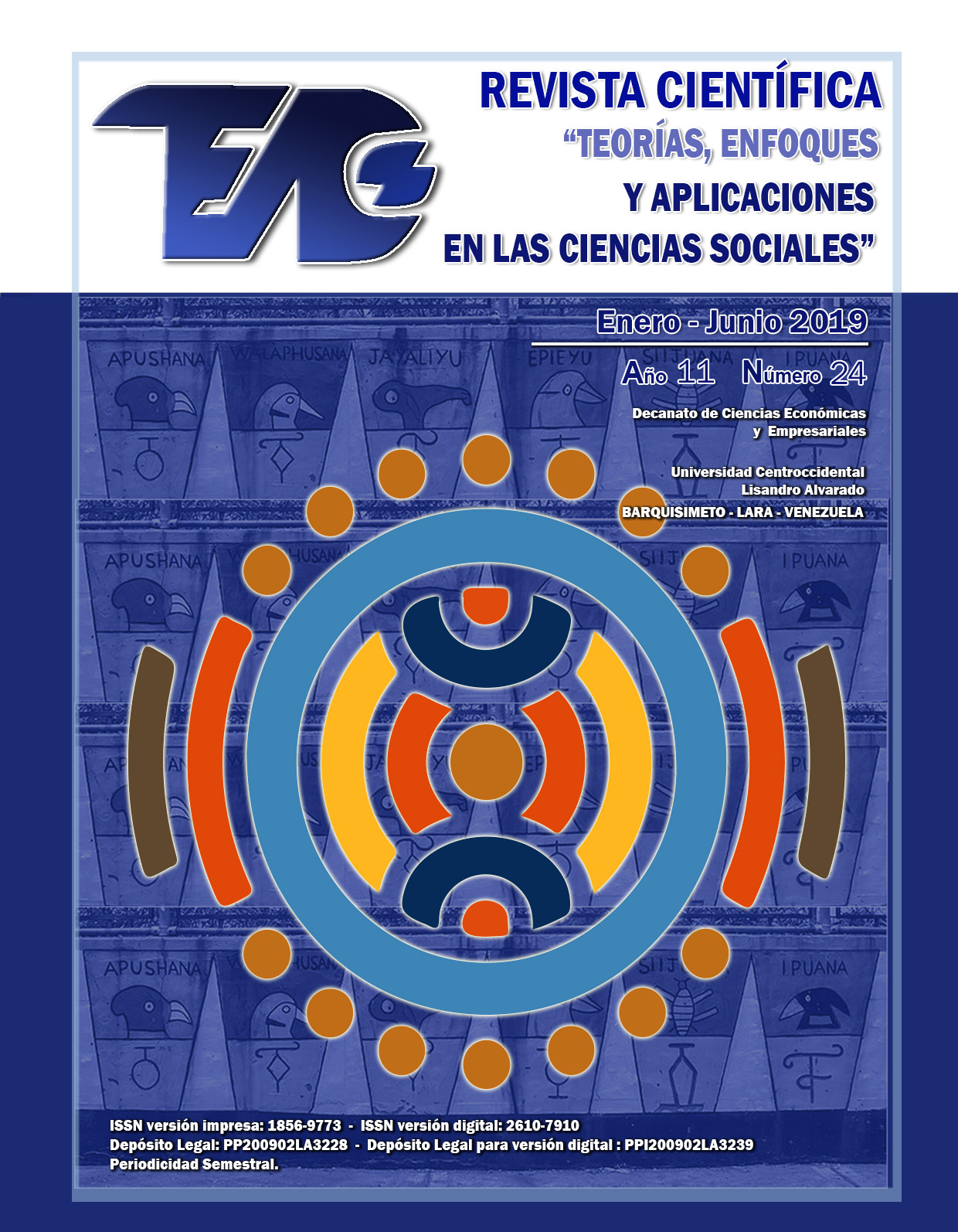Resilience of the university teacher as an organizational strategy in the context of transdisciplinarity
Keywords:
resilient teacher, organizational strategy, transdisciplinary contextAbstract
The purpose of the research was to evaluate the action of the university professor based on resilience as an organizational strategy in a transdisciplinary context. The predominant paradigm in the study is quantitative, under a field design, descriptive and holistic. The theoretical foundations were addressed: Must Be of Teaching Action - Positive Resilient Argument; Knowing and Doing Teaching - Resilient Positive Reticulation, Teaching based on Resilience, Resilience of the teacher as an organizational strategy and Teaching resilience in the context of transdisciplinarity, this served as an interpretive framework for the findings obtained. The methodological procedure was derived from the answers given by 43 teachers from the Dean of Economic and Business Sciences (DCEE) of the Centroccidental University "Lisandro Alvarado" (UCLA). The agglutination of the behavior of the data was carried out through a questionnaire on a Likert scale. The results determined that the University should promote the application of teaching strategies based on Resilience to help increase educational quality, through institutional self-evaluation, the construction of knowledge and pedagogical, scientific, ethical and humanistic that promotes the student obtaining new knowledge and progress in their educational development. It is concluded that the reconstruction of the teaching action is required in the face of the vicissitudes of the complex university world, capable of considering the distinctions and realities that are alternative to each other, removing the transdisciplinary background for a high level of result in their educational praxis and in the conduction of the teaching
Downloads
References
Bedoya, J. (2000). Epistemología y Pedagogía. Bogotá: Ecoe Ediciones.
Castellejo, J. (2006). Teoría de la Educación. Madrid: Alanda-Anaya.
Corredor, J. (2007). La Planificación Estratégica. Bases teóricas para su aplicación. Valencia: Vadel Hermanos editores.
Díaz, M. (2001). La Evaluación del Profesorado Universitario: Criterios y Propuestas para Mejorar la Función Docente. Revista de Educación; 15: 145-149.
Follari, A. (2008). Práctica Educativa y Rol Docente. Madrid: Aique Grupo Editor.
Freire, P. (2000). Pedagogía de la Esperanza. Siglo XXI Editores. México.
Hernández, G. (2004). Caracterización del Paradigma Humanista en Educación. México: ILCE- OEA.
Grotberg, E. (2003). Resiliencia, Descubriendo las Propias Fortalezas. Argentina. Paidós.
Hernández, R., Fernández C., Baptista, P. (2009). Metodología de la Investigación. México: Mc Graw Hill Interamericana.
Kotliarenco, MA. et al.(1996). Resiliencia: Construyendo en Adversidad. Ceanim, Santiago de Chile.
Manciaux, M. (2003). La Resiliencia: Resistir y Rehacerse. Gedisa, Barcelona.
Marcano, N., Reyes, W. (2008). Categorías Epistemológicas para el Estudio de los Modelos de Formación Docente. Bogotá: Multiciencias.
Matilla, L. (2011). Los Modelos de la Planificación Estratégica en la Teoría de las Instituciones Públicas. Barcelona-España. Editorial UAC.
Martínez, M. (1999). La Nueva Ciencia, su Desafío, Lógica y Método. México: Trillas.
Minolli, C. (2004). Empresas con Gerentes Resilientes, algunas ideas para construirlas. Documento en línea. Disponible en: http://www.ucema.edu.ar/u/cpcbm/Investigacion/Resiliencia/Empresas_Resilientes.pdf. Consulta: 15/03/2017.
Morín, E. (2000). El Método; el Conocimiento del Conocimiento. España: Ediciones Cátedra.
Morles, V. (2005). Educación, Poder y Futuro. 4ª edición. Caracas: Ediciones UCV.
Ríos, P. (2005). Urge Reorientar la Función Docente. Revista del Consejo Nacional Español Técnico de la Educación; 48: 189-197.
Rodríguez E.A. (2012). Acción de acompañamiento académico. Modelo de intervención docente que posibilita evolución conceptual, metodológica y actitudinal. Tesis Doctoral en línea. España: Universidad de Burgos. Descargado de la red el 15 de Marzo 2017 desde: http://dspace.ubu.es:8080/tesis/bitstream/10259/85/.../Rodríguez_Garrido
Rowden (2003). El Arte de la Identidad. México. Mc Graw Hill.
Salcedo, H. (2007). Necesidad de un Perfil Integral del Profesor Universitario. Revista Aguda Educativa; 4(1): 27-49.
Tardif, M. (2012). Los Saberes del docente y su desarrollo Profesional. Estudio en los distintos niveles educativos españoles. Trabajo presentado a la Universidad de Málaga: España.
Ugas, G. (2012). La Complejidad: Un Modo de Pensar. San Cristóbal Venezuela. Talleres Gráficos Lito Formas. 3ra edición.
Valenzuela, A. (2003). El Perfil Profesional del Educador para la Enseñanza Universitaria. Revista Perspectiva Educacional; 6(1): 124-132.
Vílchez, N. (2005). Fundamentos del Currículo. Fondo Editorial URBE. Maracaibo.
Published
How to Cite
Issue
Section
Derechos del/de autor/es a partir del año de publicación
Esta obra está bajo la licencia:
Creative Commons Reconocimiento-NoComercial-CompartirIgual 4.0 Internacional (CC BY-NC-SA 4.0)
Las opiniones expresadas por los autores no necesariamente reflejan la postura del editor de la publicación ni de la UCLA. Se autoriza la reproducción total o parcial de los textos aquí publicados, siempre y cuando se cite la fuente completa y la dirección electrónica de esta revista. Los autores(as) tienen el derecho de utilizar sus artículos para cualquier propósito siempre y cuando se realice sin fines de lucro. Los autores(as) pueden publicar en internet o cualquier otro medio la versión final aprobada de su trabajo, luego que esta ha sido publicada en esta revista.



